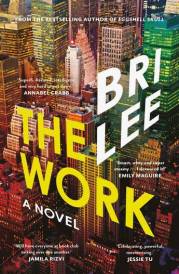Terry Gilliam The Imaginarium of Doctor Parnassus
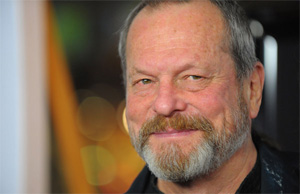
THE QUIXOTIC IDEALISM OF TERRY GILLIAM
EXCLUSIVE Terry Gilliam, The Imaginarium of Doctor Parnassus Interview by Paul Fischer in Toronto.Terry Gilliam remains one of the most original and vibrant cinematic voices of all time, a rare cinematic iconoclast, who bucks narrative convention refusing to abide by the conventions of traditional storytelling.
Perhaps this is due to his beginnings as the animator during the Monty Python era and his feature directorial debut as co-director of the now classic Monty Python and the Holy Grail. Since then, Gilliam has carved a niche as an innovative director whose works polarize but fascinate us, from the likes of Brazil, 12 Monkeys, Time Bandits, Tideland, The Fisher King and The Adventures of Baron Munchausen to name a few. Yet nothing compares to his most talked about film in years, The Imaginarium of Doctor Parnassus, starring Christopher Plummer in the titular role and his extraordinary 'Imaginarium', a travelling show where members of the audience get an irresistible opportunity to choose between light and joy or darkness and gloom.
While much has been said of this as Heath Ledger's final screen appearance, the film is far more than that and remains a defining study of mortality and age, perhaps the perfect film for Terry Gilliam who made the film during the final days of his seventh decade. It was during the film's Toronto Film Festival premiere that an ebullient Mr Gilliam talked at length to Paul Fischer in this exclusive interview about the film's personal themes, working with mutual friend Ledger, Hollywood and of course his quixotic dream to finally make the film that has eluded him for so many years.
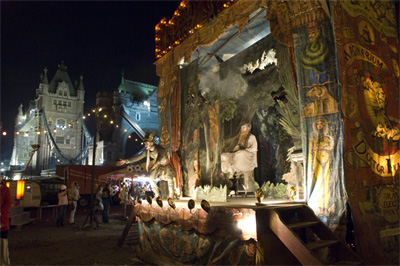 QUESTION: Terry, is The Imaginarium of Doctor Parnassus the film that ultimately epitomizes and exemplifies Terry Gilliam of this age, at this stage of his life?
QUESTION: Terry, is The Imaginarium of Doctor Parnassus the film that ultimately epitomizes and exemplifies Terry Gilliam of this age, at this stage of his life?TERRY GILLIAM: It's not a bad version of me. [LAUGHTER] It's got a lot that is autobiographical, in a sense, trying to amaze people, astound people, and people aren't being as astounded and as amazed as much as I had hoped they would be. I think there's all the mortality that's very much central to the theme. I love the idea of a 60-year-old wife giving birth to a child, and Parnassus thinks he's clever, but things just keep happening to him, making him very flawed. That's what I like about Parnassus.
QUESTION: Do you have a lot in common with him?
TERRY GILLIAM: At times. I mean, obviously, when I'm writing - to be honest, I kind of identify with all the characters in the thing, but there's a Parnassus quality. You're sitting on your friends, pretending to float in the air. [LAUGHTER] Nobody buys it. I think it's a kind of greediness. I want more people to be astonished, more people to use their imagination, more people to do what they do, and be free from the kind of closed world that the media presents as reality. I always find it's a much smaller audience than I would like and that's unfortunate, but the great thing about that smaller audience, they're passionate and they're the ones that might end up doing something more wonderful.
QUESTION: I mean, obviously there are these two worlds that are visually created for this. The world of sort of contemporary London - dark and dour and then, of course, the world inside that magic mirror. When you write a script like this, do you see all this in your head as you're writing it? Do you visualize it? Do you storyboard? Or is it all, first of all, put on paper?
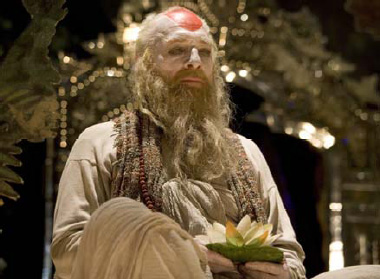 TERRY GILLIAM: No, it's all happening on many different levels, all at the same time, because we didn't even have a story when we started, just a couple ideas. You know, old traveling theatre arrives in modern London. Boom. Okay. And then to save money, let's just have little bits of the big expensive fantasy sequences. [LAUGHTER] We might be able to make it with a budget that we can actually get the money for and I may actually work like that. And it's kind of this combination. One, it's like, being very, very pragmatic about the realities of financing, and what you get done and the other side, wanting to fly, which is kind of how Charles and I worked. Then little by little, there was one point I said, "Let's make it kind of a compendium of what I'm good at." So I kept thinking of Fanny and Alexander, and Amarcord, because those were moments when they relaxed a bit. Bergman was no longer dark and black and white and it was just wonderful, the same with Fellini. And then I remembered watching The Seventh Seal again. Oh, you know, that little traveling troupe there, with - kind of, Mary, Joseph, and the baby, that became Valentina and Anton, with the baby at the end. [LAUGHTER]. And then, of course, there are Python moments you want to throw in there.
TERRY GILLIAM: No, it's all happening on many different levels, all at the same time, because we didn't even have a story when we started, just a couple ideas. You know, old traveling theatre arrives in modern London. Boom. Okay. And then to save money, let's just have little bits of the big expensive fantasy sequences. [LAUGHTER] We might be able to make it with a budget that we can actually get the money for and I may actually work like that. And it's kind of this combination. One, it's like, being very, very pragmatic about the realities of financing, and what you get done and the other side, wanting to fly, which is kind of how Charles and I worked. Then little by little, there was one point I said, "Let's make it kind of a compendium of what I'm good at." So I kept thinking of Fanny and Alexander, and Amarcord, because those were moments when they relaxed a bit. Bergman was no longer dark and black and white and it was just wonderful, the same with Fellini. And then I remembered watching The Seventh Seal again. Oh, you know, that little traveling troupe there, with - kind of, Mary, Joseph, and the baby, that became Valentina and Anton, with the baby at the end. [LAUGHTER]. And then, of course, there are Python moments you want to throw in there. QUESTION: When you had this ready and you were ready to cast it there are only certain actors of a certain age who could pull that off.
TERRY GILLIAM: It was pretty easy. There wasn't much of a choice. And Christopher, having worked with him on Twelve Monkeys, was great. It was funny, because I saw New World, the Terry Malick film and I thought, "Chris, you look just beautiful. Come on." So I wrote him a note, and he said, "Yeah, let's do it." I mean, you wanted somebody like that. You wanted a great, great actor, because I'm not convinced whether Parnassus is telling the truth, or he's just a con man. I never knew and I still don't know. So I thought Chris would give it all the gravitas that we could need, especially when I do double acts with him with Verne Troyer.
QUESTION: Troyer had the best lines in that movie, too, I think.
TERRY GILLIAM: Well, the first thing I showed him when I showed the script to Verne, and I just opened the page to when Parnassus says, "Ah, Percy, what would I ever do without you?" And Percy says, "Get a midget." So that was the first thing I showed to Verne, and said, "You like it?" "Love it." And that was it. [LAUGHTER] I mean, Verne was a tiny moment in Fear and Loathing, tiny being - time, space, height, everything and I always thought Verne was an extraordinary guy. He's so smart, and he's funny, and he's got this really cool attitude, so he'd be perfect. And what he was delighted about - it gave him a chance to really act, to show that he was a serious actor. I think he's beautiful in the thing, just wonderful.
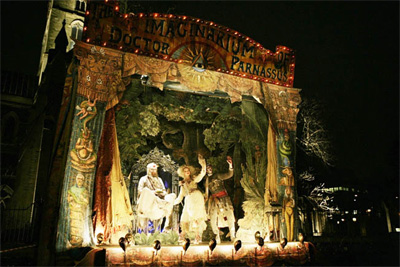 QUESTION: I'm not going to ask you about the whole Heath Ledger-post thing, but I would like to ask you about the casting of him Now obviously, you worked with him on a less critically-acclaimed film.
QUESTION: I'm not going to ask you about the whole Heath Ledger-post thing, but I would like to ask you about the casting of him Now obviously, you worked with him on a less critically-acclaimed film. TERRY GILLIAM: [LAUGHTER] That's very nicely put.
QUESTION: But, did you notice an evolution in growth in Heath as an actor, that convinced you that you would want him for this movie?
TERRY GILLIAM: No, after Grimm's I would have put him in everything.
QUESTION: Really?
TERRY GILLIAM: I offered him several parts, which he turned down. [LAUGHTER] I loved Heath. I just thought he was a sensational actor and he was just getting better and better. I mean, the first time I saw him in Four Feathers, he just leapt off - I said, "That is a movie star. An old-fashioned one," because he's manly, and he's strong. And he was like, 19 or 20 when he did that. What was he, 21? I don't know what he was. But he was a kid and I was looking at somebody who was 35, I thought. And even when we did Grimm's, there was one night I took him out to watch a Romanian gypsy music thing, because I wanted him to hear this stuff. We got there a bit early, went across the street, had a pizza, are talking. And - you know, Matt was 33, and I thought Heath was the same kind of age. And he said, "No, I'm 24." I said, "What? What?" [LAUGHTER] There was -such an ancient wisdom about him, and an oldness, a maturity, that was amazing. So, it was funny, because after Brokeback Mountain, I offered him a couple things. The year after Brokeback Mountain was a strange year for him, because he hadn't enjoyed all the publicity, and all the bullshit, hated it. So there was a year of, "What do I do? I don't want to do that. I want to go back to what I used to do," Australian films, he was going to make. So it was a difficult year and what happened with Parnassus, he was doing The Joker, he was working in London and he was working on a music video for Modest Mouse, which is now out on the web, with my friend Daniel, who had done the storyboards for Grimm's, and Heath had known at that point. I had put him to work in the big desk at our special effects company. I was showing my storyboards one day to the effects guys, talking about them and in the middle of this presentation, suddenly Heath sends a little note over, "Can I play Tony?" I said, "Are you serious?" He said, "Yes, I want to see this film." And that was it.
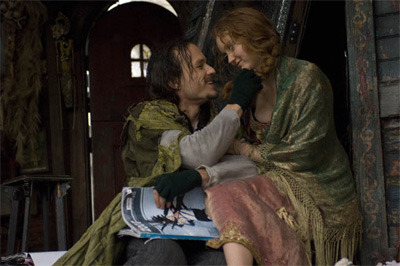 QUESTION: Did you encourage him to improvise at all?
QUESTION: Did you encourage him to improvise at all? TERRY GILLIAM: Yeah. I mean, I don't normally do that, but he was just doing things, and I was not going to limit him, when he was throwing in all sorts of new ideas, even different words. I just let it run, because it was like he was on fire. It was just going. He was flying and was enjoying this character so much, because the character is ia chameleon, so you can do everything and anything. And what you don't get to see is what he was going to do on the other side of the mirror, because he had all sorts of things planned. But I just thought, "You're so good." I just didn't want to hold him back. We all used to sit - Nicola Pecorini, my cinematographer, the continuity lady - during the take - every take, and he was surprising us with new and wondrous things. I said, "Just let it ride. This is good." [LAUGHTER]
QUESTION: I must say that the actors you selected to play his kind of alter ego of his, as it turned out, were really wonderful. And I was particularly struck at - I thought Johnny and Colin, in particular, I loved in this. And they're very funny.
TERRY GILLIAM: But it's like, serious funny, is what it is. It's not jokey stuff. It's interesting. I mean, of the three of them Johnny and Colin have an energy much closer to what Heath's energy was, which is why I think you may respond to it that way. Jude's is different. But I was only going to call friends of Heath's. I didn't want anybody else to be involved. It was just those who were close, and loved him. And Colin said when he was doing his, that there were days he thought he was channeling Heath. Colin's extraordinary. This man is Johnny Depp, Heath Ledger, Robert Downey Junior. He's at that level of acting.
QUESTION: You know, you make these films that are so visually exquisite, yet you don't seem to forget about the actors. Is it a balancing act, for you to make sure that character and visuals go hand in hand, in anything you do?
TERRY GILLIAM: Yeah, I know. I mean, the visuals are there to support whatever ideas we're trying to present. They're there for a reason. They're not just pretty backgrounds, I think. [LAUGHTER] But it's the actors that it's about. I'm bored with the other stuff. I can do the other stuff in my sleep, the CGI stuff which is a pain, and hard work. I can do it. The actors are where the joy of filmmaking is for me now, because they're the ones that bring it to life. You know, we write something, and it's just a bunch of words, but the actors come in, and the character just expounds into things. I want to be surprised and I don't want them to do what I want them to do. I want them to surprise me, because the process of making films is boring. It's tedious. I mean, this is three years, I've been on this film, so, you've been with it every day of your life, every hour of your life and when you get on the set and the actor surprises you with something you didn't intend - I don't fight it. I love it. I mean, if it goes an area I don't think it should go, I will pull it back, but no, I want to give space for that. And working with good actors is breathtaking. I mean, they're brave people and I think my skill is encouraging them to be bold. I'm a good audience. I laugh when they're funny, and I cry when they're tragic. And I just want to make them feel so comfortable that they will take chances they might not normally take, and trust me that I'm not going to expose them when they fall on their face.
QUESTION: You're extraordinary in the way that you take risks, and you've never had to deal so much with the mainstream studio system. I was wondering, is your relationship with Hollywood in some ways quixotic? I mean, is it a sort of a lance-at-windmill relationship?
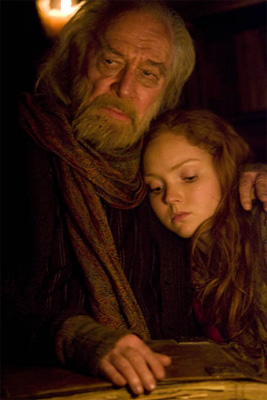 TERRY GILLIAM: Yeah - I mean, I probably hate them more than they hate me. But the irony is, the three films I actually did in Hollywood, Fisher King, Twelve Monkeys, and Fear and Loathing, were the easiest films I've ever done, because I do control what I do. I will not let them control it. I will literally physically destroy humans if necessary. I will not let them take over the work, because it's not my work, it's the work of the collaborative group that makes it. The actors, the writers, the tech- everybody and the suits thrive on fear. They're worried about losing their jobs, so that all their decisions and attitudes towards something are fear-based, I think, where what we do is positive-based. We may make huge mistakes, and we do, but I think it's coming from the right place.
TERRY GILLIAM: Yeah - I mean, I probably hate them more than they hate me. But the irony is, the three films I actually did in Hollywood, Fisher King, Twelve Monkeys, and Fear and Loathing, were the easiest films I've ever done, because I do control what I do. I will not let them control it. I will literally physically destroy humans if necessary. I will not let them take over the work, because it's not my work, it's the work of the collaborative group that makes it. The actors, the writers, the tech- everybody and the suits thrive on fear. They're worried about losing their jobs, so that all their decisions and attitudes towards something are fear-based, I think, where what we do is positive-based. We may make huge mistakes, and we do, but I think it's coming from the right place.QUESTION: And talking about quixotic - will we ever see Don Quixote?
TERRY GILLIAM: Well, I was, three weeks ago, in Spain, looking at the locations. [LAUGHTER]
QUESTION: Oh, you were?
TERRY GILLIAM: The plan is next springtime.
QUESTION: Is it going to be a very sort of strange experience, going back to that, after what had happened?
TERRY GILLIAM: Well, no. Here's what's funny about it is that having waited seven or eight years to get the script back from the French legal system, and Jeremy Thomas finally wrenched it from their hands, during that period, everybody kept saying, "If you really want to make it, why don't you just rewrite the script and go," because it's public domain material, blah blah blah. I said, "No, it's a perfect script. It's the best thing we've ever written. Seven or eight years later, we get the script back, I read it. Whoops! Whoops! We have some serious work to do here, boys and girls." But it was great. It was like what I've always wanted - it's like being a painter, where you've finished what you thought you set it aside for some period, and then there's this space. Then you come back to it, and you look at it with an objective outsider's eyes and it just wasn't good enough. So Tony and I have rewritten it and I genuinely believe we've written a really good script, despite the fact that 2/3 of it is what was there before. But everything is different, in the way the characters evolve, and who the characters are, and why they do what they do. So it's fresh. Johnny won't be in it, or Jean Rochefort. So it's kind of like a new movie.
QUESTION: Whom are you going to cast?
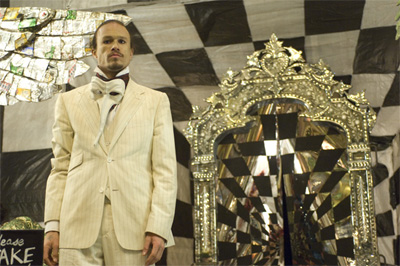 TERRY GILLIAM: I'm not going to tell you. [LAUGHTER]
TERRY GILLIAM: I'm not going to tell you. [LAUGHTER]QUESTION: Chris Plummer would make a perfect Don Quixote, I would have thought.
TERRY GILLIAM: He could be. [LAUGHTER] But we'll see.
QUESTION: So, you do have specific people already that you're talking to.
TERRY GILLIAM: Yeah. I'm talking to one particular person at the moment. I mean, I keep having these meetings, which are the pragmatic, realistic, feet on the ground meetings, not what we really would like to world to be like. The world right now in the movie business is really bad to get money for movies.
QUESTION: But yet, you managed to get that money. So how do you manage to do that?
TERRY GILLIAM: I did it before the crunch. But right now, selling movies that have been made - at this festival right now, there are so many wonderful films that don't have buyers.
QUESTION: I haven't heard anything about anything that's been sold, actually.
TERRY GILLIAM: They're not selling. I won't even tell you the story of Parnassus, because you can't believe how difficult it has been to sell this film.
QUESTION: You know, Europeans would love it. I mean, they would go apeshit over this movie.
TERRY GILLIAM: The Americans will go apeshit over the movie. But you have to go through this gauntlet of terrified executives, who have no money. The money disappeared overnight. Isn't that amazing? It's like God died. It's like, Nietzsche moment. God is dead, money's dead.
QUESTION: But they'll pay $200 million to make Transformers.
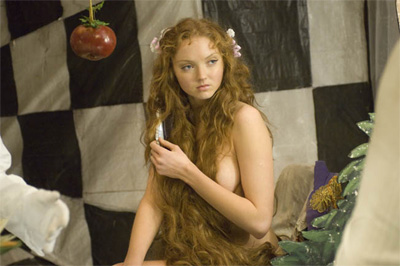 TERRY GILLIAM: Of course they will. But that was actually booked before the crunch, but will they spend the $300 million for Pirates 4? Or the $200 million for The Lone Ranger? Are they going to do it or not? I don't know. But, I think what's happening in Hollywood at the moment - and it has been like this - is, you make a film for $200 million, or $2 million, and there's nothing in between. I mean, the $20 million film, it's really hard to get the money for that. I mean, ours is 25 at the end of 2006. Or was it 2007? It all goes funny. But, anyway, what I was saying - you know, Brokeback was out, Heath was the hottest thing going everybody wanted Heath. Heath was turning everything down. Okay, we have Heath. Summer of 2008, The Dark Knight is coming out. Who's going to be the biggest star on the planet? Heath Ledger. I mean, this was obvious - you could see what was going on. Yet we couldn't get any money out of Hollywood. So it's a UK-Canadian co-production, European sales, all that. No American money.
TERRY GILLIAM: Of course they will. But that was actually booked before the crunch, but will they spend the $300 million for Pirates 4? Or the $200 million for The Lone Ranger? Are they going to do it or not? I don't know. But, I think what's happening in Hollywood at the moment - and it has been like this - is, you make a film for $200 million, or $2 million, and there's nothing in between. I mean, the $20 million film, it's really hard to get the money for that. I mean, ours is 25 at the end of 2006. Or was it 2007? It all goes funny. But, anyway, what I was saying - you know, Brokeback was out, Heath was the hottest thing going everybody wanted Heath. Heath was turning everything down. Okay, we have Heath. Summer of 2008, The Dark Knight is coming out. Who's going to be the biggest star on the planet? Heath Ledger. I mean, this was obvious - you could see what was going on. Yet we couldn't get any money out of Hollywood. So it's a UK-Canadian co-production, European sales, all that. No American money.QUESTION: Is that a bad thing?
TERRY GILLIAM: Yeah. [LAUGHTER] I'm going to die soon. I need to make a few more films.
QUESTION: Altman was in his 80s when he made his last movie.
TERRY GILLIAM: And he was screaming and shouting. He couldn't get money to do what he wanted either. I know. It goes on and his were cheaper than mine, I can guarantee you.
QUESTION: Do your perceptions of humanity that you explore cinematically, do they change, the older you get? Do you think you're a quieter, gentler filmmaker now, than you were?
TERRY GILLIAM: I think so. I think I'm less angry, I'm more tired, I'm more sentimental.
QUESTION: Is that reflected in your work?
TERRY GILLIAM: Yes you saw it.
QUESTION: Right.
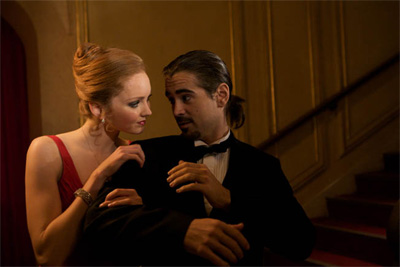 TERRY GILLIAM: Well, that's the last thing I did. [LAUGHTER] I think Tideland is a very sweet film. People didn't think so. [LAUGHTER] They thought it was a horror, but I think it's one of the most sweet, tender films I've ever made. And people are slowly coming around to that, with Tideland. That's what's interesting. Every few weeks, somebody writes me something saying, "I've just seen Tideland. It's beautiful." And that's not what would be the impression when it was made. So, I don't know. I mean, I hope I'm ahead of the curve all the time, which is really bad, because you don't get the money when you're ahead of the curve. You get the money when you're on the curve. [LAUGHTER]
TERRY GILLIAM: Well, that's the last thing I did. [LAUGHTER] I think Tideland is a very sweet film. People didn't think so. [LAUGHTER] They thought it was a horror, but I think it's one of the most sweet, tender films I've ever made. And people are slowly coming around to that, with Tideland. That's what's interesting. Every few weeks, somebody writes me something saying, "I've just seen Tideland. It's beautiful." And that's not what would be the impression when it was made. So, I don't know. I mean, I hope I'm ahead of the curve all the time, which is really bad, because you don't get the money when you're ahead of the curve. You get the money when you're on the curve. [LAUGHTER] I want to be just doing things. I look at Brazil, and I keep getting every other day somebody saying, "But it's all about now and you did it in '84." Well, it was always here. It's just - people don't see the world around them. I always said Fellini was a great fantasist. No. When I went to Rome, he was a great documentary, but people didn't see those people before, until he put them on screen. Then you see them and that's the way the world is, to be full of all these potential worlds. But it's about your perception of these potential worlds and they're out there. I hate the word "artist," but I'll have to use it, because there's no other one. That's what an artist's job is, is to try to open those windows to people and say, "Look at the world. It's out there, that world exists." That, I think, is what I wanted to do. And it's just a pain, when every time I try to raise money - I go into these meetings, and they say, "God, we love your work. Oh. I mean, Time Bandits. Oh, we love those. But, now, this one, I just don't know. It doesn't seem to work." And that's my life. [LAUGHTER]
QUESTION: Is it that naiveté or stupidity on the part of executives who really don't understand movies?
TERRY GILLIAM: They don't. Why should they? [LAUGHTER] They're bureaucrats caught up in a system that requires daily survival.
QUESTION: Wouldn't you love to have been making films in the '70s? Do you think that would be a nice time for you to be a filmmaker?
TERRY GILLIAM: It was a good time, because it's kind of like what I'm saying now. When is the next Cleopatra? I can't wait for it. You know, Cleopatra brought - boom. The thing went down. The cracks opened in the system, and all these films came pouring through. And I think it's got to happen soon, because the system is bust, it seems to me.
QUESTION: It can't sustain all this.
TERRY GILLIAM: No, it can't and I'm just waiting for the revolution. I thought maybe the big credit crunch is going to do it. I think it's set the fissures that are going to split open. It's going to take another bit of time, because nobody knows who the new fool in Hollywood is. This is my phrase. The New Fool in Hollywood. The New Fool in the '70s was the Saudis. The '80s were the Japanese. The '90s were the Germans. And then in the 21st century, it was the hedge funds. That's what supported Hollywood through all those periods. Who is the new fool? I don't know. And nobody knows yet.
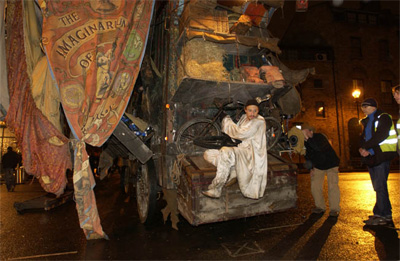 QUESTION: Have you thought about beyond Don Quixote? Or do you think that that will be your swansong?
QUESTION: Have you thought about beyond Don Quixote? Or do you think that that will be your swansong? TERRY GILLIAM: I do one thing at a time. I'll be dead. [LAUGHTER]
QUESTION: You will not be dead! You'll outlive me!
TERRY GILLIAM: Heath had too much life, and he's dead. So - I mean, that's what worries me. That's a shock that is hard to get over, because you're dealing with somebody so full of life. And it's over. Some woman journalist the other night came up to me, who thought she was being really clever. And she said, "Now, but what about all the drugs he was taking?" "What the f**k are you talking about? Where do you read that s**t?" "In the press." I said, "You're a journalist. Do you believe what the press says?" I haven't been so angry in a long time, because all of us who knew him know what was going on. I mean, I couldn't believe this woman and the problem is, there are others who think like that.
QUESTION: Well, please continue to do buck the system.
TERRY GILLIAM: [LAUGHTER] Let's see who lives the longest.
QUESTION: I'll be here with you at least in two years time, talking about Don Quixote.
TERRY GILLIAM: Good. Thanks.
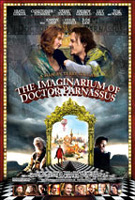
The Imaginarium of Doctor Parnassus
Starring: Heath Ledger, Christopher Plummer, Lily Cole, Andrew Garfield, Verne Troyer, Tom Waits, Johnny Depp, Colin Farrell, Jude LawDirector: Terry Gilliam
Genre: Science-Fiction/Fantasy
In THE IMAGINARIUM OF DOCTOR PARNASSUS, director Terry Gilliam continues the trippy tradition he began with inventive films such as TIME BANDITS and BRAZIL. This time, he reteams with Heath Ledger of THE BROTHERS GRIMM, Christopher Plummer of 12 MONKEYS, and Tom Waits of THE FISHER KING.
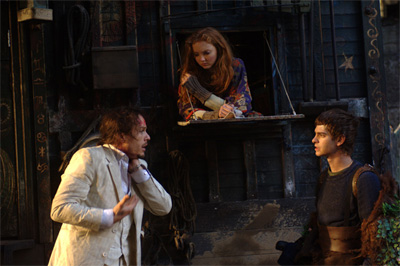
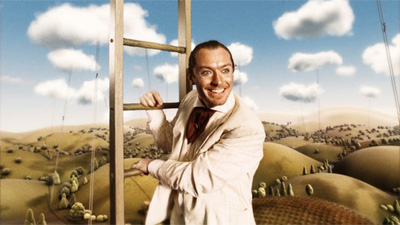
MORE
- Mission: Impossible Fallout
- Glenn Close The Wife
- Allison Chhorn Stanley's Mouth Interview
- Benicio Del Toro Sicario: Day of the Soldado
- Dame Judi Dench Tea With The Dames
- Sandra Bullock Ocean's 8
- Chris Pratt Jurassic World: Fallen Kingdom
- Claudia Sangiorgi Dalimore and Michelle Grace...
- Rachel McAdams Disobedience Interview
- Sebastián Lelio and Alessandro Nivola...
- Perri Cummings Trench Interview
Copyright © 2001 - Female.com.au, a Trillion.com Company - All rights reserved. 6-8 East Concourse, Beaumaris, Vic 3193, Australia.



